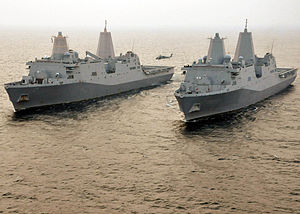
The San Antonio class is a class of amphibious transport docks, also called a landing platform/dock (LPD), used by the United States Navy. These warships replace the older Austin-class LPDs (including Cleveland and Trenton sub-classes), as well as the Newport-class tank landing ships, and the Charleston-class amphibious cargo ships that have already been retired.
Twelve ships of the San Antonio class were proposed, but only eleven were funded. Their original target price was $890 million;
The San Antonio class was designed to provide the Navy and U.S. Marine Corps with modern, sea-based platforms that are networked, survivable, and built to operate with 21st century transformational platforms, such as the MV-22 Osprey, the (since canceled) Expeditionary Fighting Vehicle (EFV), air-cushioned landing craft (LCACs), and future means by which Marines are delivered ashore.
The project embraced a "Design for Ownership" philosophy; a concurrent engineering approach that injects operator, maintainer, and trainer input into the design development process. The goal was to ensure that operational realities are considered throughout the total ship design, integration, construction, test and life cycle support of the new ships and their systems.